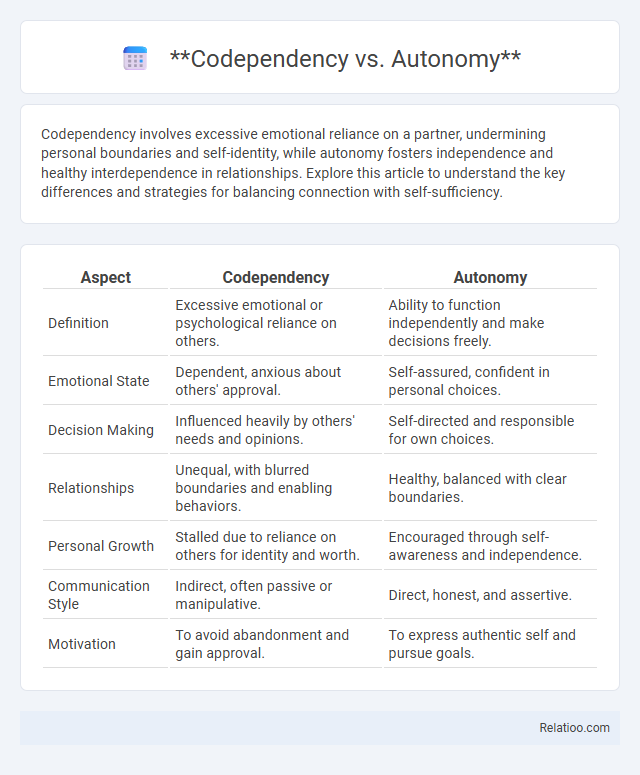Codependency involves excessive emotional reliance on a partner, undermining personal boundaries and self-identity, while autonomy fosters independence and healthy interdependence in relationships. Explore this article to understand the key differences and strategies for balancing connection with self-sufficiency.
Table of Comparison
| Aspect | Codependency | Autonomy |
|---|---|---|
| Definition | Excessive emotional or psychological reliance on others. | Ability to function independently and make decisions freely. |
| Emotional State | Dependent, anxious about others' approval. | Self-assured, confident in personal choices. |
| Decision Making | Influenced heavily by others' needs and opinions. | Self-directed and responsible for own choices. |
| Relationships | Unequal, with blurred boundaries and enabling behaviors. | Healthy, balanced with clear boundaries. |
| Personal Growth | Stalled due to reliance on others for identity and worth. | Encouraged through self-awareness and independence. |
| Communication Style | Indirect, often passive or manipulative. | Direct, honest, and assertive. |
| Motivation | To avoid abandonment and gain approval. | To express authentic self and pursue goals. |
Understanding Codependency: Key Characteristics
Codependency is characterized by an excessive emotional or psychological reliance on a partner, often leading to difficulties in establishing healthy boundaries. Individuals exhibiting codependent behaviors typically prioritize others' needs over their own, resulting in impaired autonomy and self-identity. In contrast, autonomy emphasizes self-sufficiency and personal boundaries, while overinvolvement involves intrusive or excessive participation in another's life without respecting independence.
Defining Autonomy in Relationships
Autonomy in relationships refers to maintaining your individual identity, boundaries, and self-direction while engaging in meaningful connections with others. It involves balancing emotional independence and interdependence, allowing both partners to grow without sacrificing personal values or needs. Defining autonomy ensures healthier communication, mutual respect, and emotional well-being within any relational dynamic.
Psychological Roots of Codependency
Codependency often stems from early relational experiences marked by inconsistent boundaries and unmet emotional needs, leading to an excessive reliance on others for validation and self-worth. Psychological roots include attachment insecurities, learned helplessness, and distorted self-concept, which blur individual autonomy and increase vulnerability to overinvolvement in others' problems. This dynamic contrasts with healthy autonomy, characterized by self-regulation, clear boundaries, and balanced interpersonal engagement.
The Benefits of Embracing Autonomy
Embracing autonomy allows you to establish healthy boundaries, foster self-reliance, and enhance emotional well-being by reducing the need for external validation often seen in codependency. Autonomy promotes personal growth and decision-making confidence, enabling you to maintain balanced relationships without falling into overinvolvement. Cultivating this independence strengthens your identity and resilience, leading to a more fulfilling and empowered life.
Signs You May Be Codependent
Signs you may be codependent include excessive people-pleasing, a constant need for approval, and difficulty setting personal boundaries. You might prioritize others' needs over your own while neglecting self-care, leading to emotional exhaustion and dependency. Recognizing these patterns helps distinguish codependency from healthy autonomy and overinvolvement, guiding your path to balanced relationships.
Healthy Boundaries: Striking the Right Balance
Healthy boundaries are essential for maintaining balance between codependency, autonomy, and overinvolvement. You can cultivate autonomy by recognizing your own needs and emotions while respecting others' space without becoming emotionally enmeshed. Establishing clear limits prevents overinvolvement, fostering mutual respect and empowerment in relationships.
Emotional Impact of Codependency vs Autonomy
Codependency often leads to emotional exhaustion, as individuals sacrifice their own needs to satisfy others, resulting in diminished self-esteem and chronic anxiety. Autonomy fosters emotional resilience by encouraging self-awareness, boundaries, and healthy interdependence, promoting psychological well-being and greater life satisfaction. In contrast, overinvolvement can blur personal boundaries, causing heightened stress and emotional instability due to excessive responsibility for others' feelings.
Strategies for Fostering Autonomy
Fostering autonomy involves setting clear boundaries and encouraging self-reflection to differentiate between healthy interdependence and overinvolvement. You can promote independence by supporting decision-making skills and reinforcing personal responsibility within relationships. Implementing communication techniques that respect individual needs helps prevent codependency and nurtures emotional growth.
Healing from Codependent Patterns
Healing from codependent patterns involves recognizing unhealthy reliance on others for validation while fostering autonomy and self-worth. Developing clear personal boundaries and practicing self-care strengthens emotional independence, reducing tendencies toward overinvolvement in others' lives. Therapeutic approaches such as cognitive-behavioral therapy and support groups empower individuals to reclaim agency and cultivate balanced relationships.
Building Empowered and Independent Connections
Codependency often results in blurred boundaries and reliance on others for validation, hindering personal growth and autonomy. Building empowered and independent connections requires fostering self-awareness, setting healthy boundaries, and encouraging mutual support without overinvolvement. Emphasizing autonomy within relationships cultivates resilience and authentic interdependence, promoting emotional well-being and balanced connections.

Infographic: Codependency vs Autonomy
 relatioo.com
relatioo.com